When I’m done with a manuscript, and the book is in print, I’m left with my 3-ring binder which holds the final draft, any research notes, character sketches, emails from my early readers, and all the other papers that pile up about it.
I’m running out of room on my shelf, so it made me wonder what other authors did with their stuff after the book was published.
I started with my Chicks on the Case blogmates, but I’m an uber-curious gal, so I asked a bunch of others.
We take the printed manuscripts and put them in a dresser drawer. We used to have them bound with coil but that seemed a bit too ridiculous. We do save them on thumb drives as well. As for notes, we keep timelines and synopses plus our “murder notebook.”
I don’t keep much in the way of notes and I don’t print off copies. Just the way I’ve always worked. I do have outlines and timelines for each book, which is all electronic.
I have a Ball jar with a jump drive for each book including the manuscript, research, marketing stuff etc.
I put them in file folders and then boxes which go in the attic. But I always save everything on Dropbox or flash drives.
I still remember the moment when I ran out of space to keep everything and had to steel myself to chuck out annotated drafts of published books. I thought it would bother me more than it has.
Now, when the book hits the shelves, I hoy the lot into the wheelie bin, all except research notes and contracts.
Until then, I keep the drafts in a pile on top of the filing cabinet. The rubbing alcohol is for my whiteboard, by the way, but I left it to give you a laugh.
[Becky’s note: the photo seemed perfectly reasonable to me. But “I hoy the lot into the wheelie bin” did make me laugh.]
Abby Vandiver, also writing as Abby Collette
I use spiral notebooks. Years ago I used to print my books out, take them to Kinko’s and have them coil bound to read. Now I load on my Kindle to read and make notes there. I don’t do “drafts,” so really don’t have to print.
I had so many notebooks with notes from multiple books in them that I started buying 5-Subject ones. Once they’re full, I pack them in boxes and put them away.
I do nothing with them! They’re on my hard drive. I have notebooks stuffed with notes, ideas, outlines, etc. Nothing organized. I figure once it’s in print, why do I need a hard copy?
I used to keep all my manuscripts, but now I have eleven published novels for adults (written as Kris Bock), two more sold, and several more unsold. Add to that a dozen unsold and seven published middle grade novels (written as Chris Eboch), plus some fifty work for hire nonfiction and fiction titles—that’s a lot of manuscripts! So I merely keep the electronic documents and recycle the paper. I do keep research material in printed form, if I don’t have it on the computer and if I think I might use it again for something else. I might keep an older version or two of a manuscript on the computer, but in general, I’m going for clean and simple rather than trying to save everything I’ve ever done. I’ve never needed the supplemental materials after publication. Now when it comes to works in progress and notes on new ideas, I have a big stack of folders of those.
I have this delusional nightmare in which my books are so worth copying that someone else will print them and make billions, and I might have to prove I wrote them first. So I have binders with the final edit copies in them. Why, when I have them on my computer? Leave me alone, it’s my delusion.
[Becky’s note: Mary, I’ll see your delusion and raise you some paranoia. Often I save old drafts to burn in the backyard fire pit, but when I throw away my old marked up paper copies, I distribute them across several trash cans, and one shredder. Someone pawing through my beautiful, beautiful words at the dump might be able to get their hands on pages 27-35, 82-96, 145-163, 199-218, 256-277, and 342-355, but they’ll have to piece it together the rest of the way! *steeples fingers in nefarious manner *
Donna Schlachter also writing as Leeann Betts
I keep mine in a file folder in a filing cabinet drawer. Yes, I recently had to buy another 4-drawer cabinet to keep me better organized. But I also keep in this file folder any publisher communication; copyright information for indie-published books; as well as calendars for time lines. I keep the Book Information Sheet with blurb, tagline, synopsis, details such as ISBN and publication date and links on my computer, as well as the final manuscript and cover images.
I have all my files backed up in various places on my computer. In Dropbox, in OneDrive, not to mention that every manuscript is saved as an attachment in an email to my agent and my publisher. When I’m finished with my final edit from the publisher, they go in a file in my desk. I’m either going to have to rethink that plan after one more book, or get a bigger desk.
Bigger desk seems easier, Libby, but that’s just me.
Once I’ve got the book in hand, there’s not much point in keeping a paper copy of the final manuscript. (I do keep all iterations on my hard drive, regularly backed up, in case I need to check a detail, or for some future scholar who wants to track the progress of my drafts. Ha.) But I’m a planner and a plotter. For each series and standalone, I create a “bible,” a 3″ 3-ring binder with sections for notes, calendars, outlines, sketches, and the initial proposal—anything I create while writing. Some are recurring, like the character notes and style sheets, while others, like the notes and outlines, are specific to the work-in-progress. Odd bits like newspaper clippings or magazine pages with a picture of a character’s kitchen or truck can go in a slide pocket in the front of the binder or a plastic sleeve.
For a series, when the manuscript is done, I tuck the notes, outlines, and anything else specific to that book in a 1″ binder labeled, e.g. “Spice #5 Notes,” and start the process over again for the next in the series. (I have tons of binders leftover from my legal practice, but I can see a day when I might have to go shopping!)
There’s also no substitute for a physical notebook or sketchbook for each series or stand-alone and those get tucked on the shelf, too.
Leslie and I like our 3-ring binders!
So that’s a little peek backstage at some writers at work. I love learning how other authors work because—and this may surprise you—there’s no manual for writers. Weird, huh, since we’re, yanno, writers. I always say that if you put 100 writers in a room and ask how they do something, you’ll get 105 answers.
But that’s why I love them so!
What other backstage stuff are you curious about? Let me know and I’ll start asking!
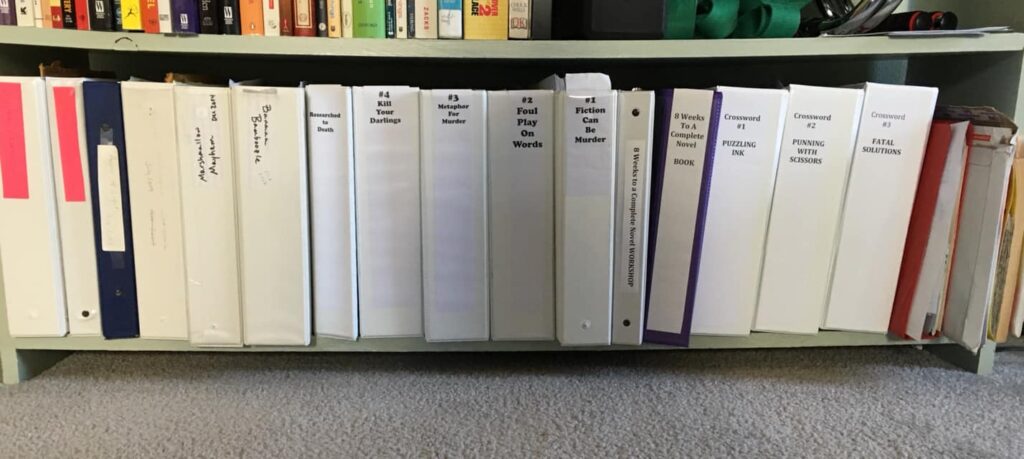
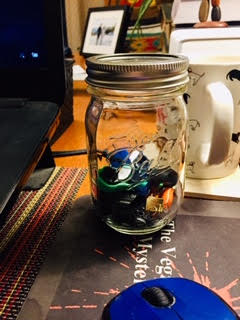
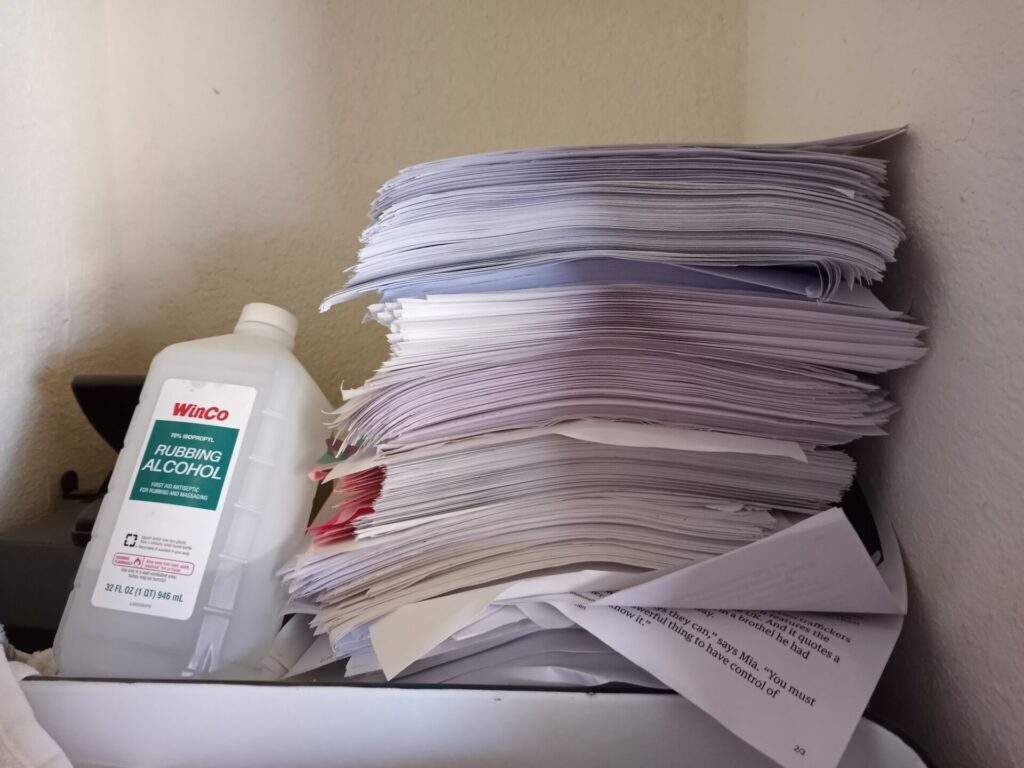
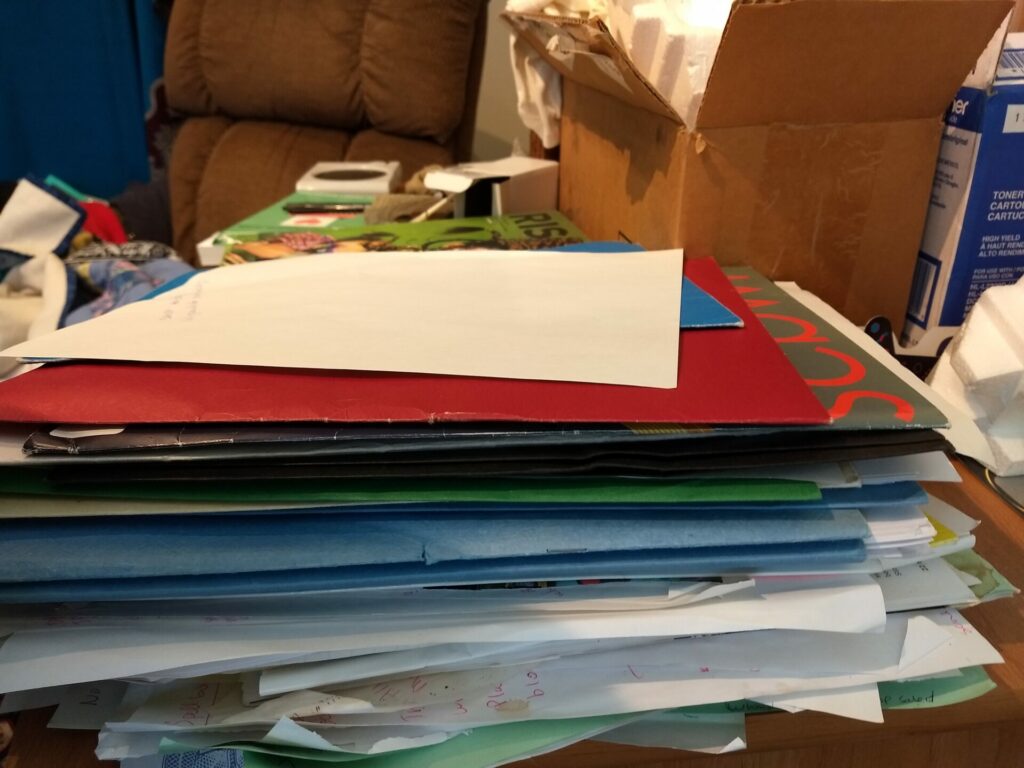
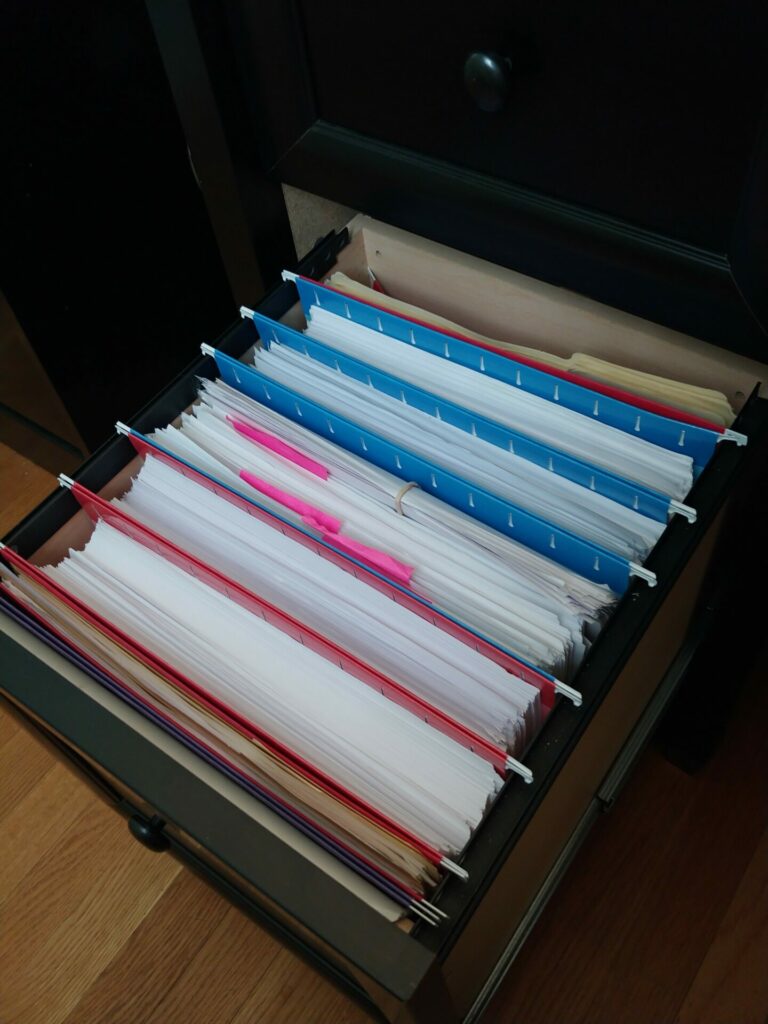
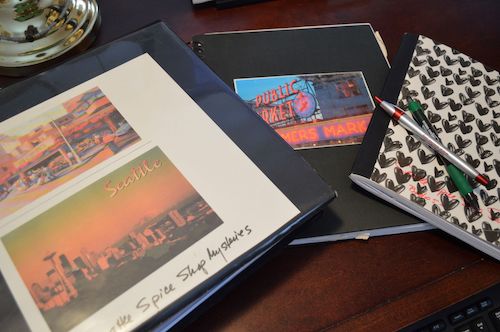
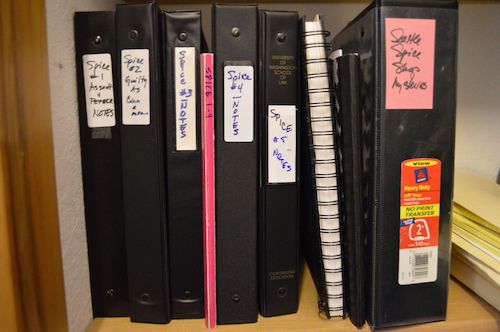
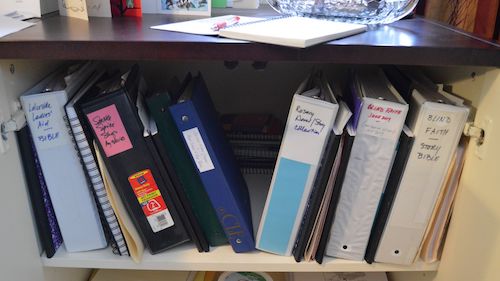
13 thoughts on “I’m Losing Sleep Wondering!”
What fun! Thanks for the glimpse inside other writers’ offices and desk drawers. And wheelie bins.
I have the feeling more use of wheelie bins is in my future! Thanks for sharing your process, Leslie.
Happy writing!
Wow, that’s some great information! I never even thought of all the space that they would take up. I can definitely use these tips in my office at home.
I’m a real paper person, so some of these ideas with NO PAPER give me sweaty palms. Plus, I worry about my computer going kaplowie if I’m only digital. I know, I know, such a worrywort.
Good luck figuring out your process!
I, too, am a paper person (that should give everyone who knows me some pause for thought, since most thought of me as a flesh-and-blood person, but “the sheet is out of the ream, now,” as we paper people like to say, and “there’s no reusing it,” we also like to say…), so I’m also getting sweaty palms reading your reply….
You must be related to Flat Stanley.
I’m a total paper person. First drafts are handwritten, every draft printed out. Notes, research,
etc never tossed. Scribbles scribbles scribbles. I have 17 file drawers full… don’t laugh. It’s either that or paper scramble In my study. I gradually use some of those old pages to score Scrabble games. But I have scrap paper that will last three lifetimes.
Ah, so I was right. Writing a book is a lot of paper. long before you actually get to “the” book! I may need to rethink the idea of writing a book…okay, I thought enough. I still want to write a book! I have a feeling I will be a planner (I just like the sound so much better than plotter.) Eons ago I was a very organized person. Not sure when the “slack” came or where it came from but I am ready to start getting back to that organized person of my youth. This time around, fortunately, I will have friends who will help me maintain my side of the organization while remaining close to sane.
LOL, Cheryl. Yes, sometimes being a “plotter” feels and sounds more like being a “plodder.”
I love hearing about the different processes authors use and I trust you will find something unique to you when the time comes. In all phases of writing, you figure out what makes sense for you based on your strengths, weaknesses, space considerations, people you live with … it all makes its mark on you and your decisions.
Good luck!
This is great! I love to see what everyone does with their manuscripts. Thanks for sharing this!
Same here. I love seeing what authors do during all their stages. Thanks for sharing part of your process!
I personally like to sneak into my neighbor’s homes and place my reams of paper among theirs…then watch them slowly go crazy trying to figure things out over…time. I’m retired, now, so I have plenty of…time.
Have I said too much?
I once heard about an author who would “reverse shoplift” and sneak his books into bookstores that didn’t typically carry him. Quite dastardly, really. Imagine that poor clerk having to figure out how to sell it!